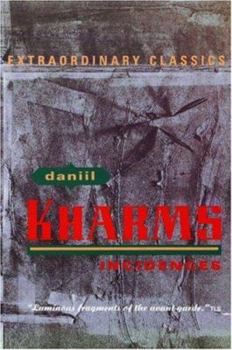Fälle: Prosa, Szenen, Dialoge
Select Format
Select Condition 
Book Overview
This collection of stories is composed of short miniatures, many of which the author called 'incidents.' By featuring so prominently in his writing sudden death, falling, accidents, chance violence, Kharms conveys more vividly than any other writer the precarious nature of life in Stalin's Russia. ?Luminous fragments of the avant-garde? TLS ?A puzzlingly beautiful monument to a minor master? Booklist ?With remarkable precision and fluid language, the stories capture everyday tension in a land where an innocent knock on the door might mean entrapment in a bureaucratic maze or even death at the hands of the military? New York Times Book Review
Format:Paperback
Language:English
ISBN:1852423064
ISBN13:9781852423063
Release Date:July 1994
Publisher:Serpent's Tail
Length:227 Pages
Weight:0.55 lbs.
Dimensions:0.7" x 5.4" x 8.1"
Customer Reviews
4 ratings
the best piece of short prose in the 20th century
Published by Thriftbooks.com User , 17 years ago
unfortunately, translation to English harms overall impression. it's far more poetic and absurdly funny in original.
"Lumininous fragments of the avant-garde" ??
Published by Thriftbooks.com User , 23 years ago
The quote on the cover - which I've used as the title of my review - sets expectations far beyond what is delivered. Kharms does an excellent job of depicting the absurdities of Communist USSR in his era ... the waiting in queques, the fear engendered by a simple knock on the door, the prevalence of bribery etc. Some of his observations - very short observations of ordinary life - are interesting perspectives similar to "reality TV". But too many seem to be journal notes of ideas not yet formulated: "On one occasion a man went off to work and on the way he met another man who, having bought a loaf of Polish bread, was wending his way home. / And that's just about all there is to it."The absurdity of the pieces is often inventive, clever, etc. ... but I found the emphasis on violent or ill-manner behavior wearing as the absurdity became to predictable.For contemporary short fiction absurdity read Barry Yourgrau. If you're interested in absurdity in Russian literature, this book is an essential piece of literary history.
Russian Future
Published by Thriftbooks.com User , 24 years ago
The bulk of the fiction of Daniil Kharms was destined for his desk drawer. Though his work for children was widely published in the Soviet Union, his other efforts were unprintable, thanks to Stalin's iron rule. These tales have now been collected in "Incidences," an admirable work, edited and cleanly translated by Neil Cornwell, that highlights Kharms's eerie obsessions: a fear of old women and children, a love of falling bodies and a sensual pleasure in the scents and sounds of daily life. With remarkable precision and fluid language, the stories capture everyday tension in a land where an innocent knock on the door might mean entrapment in a bureaucratic maze or even death at the hands of the military. By yoking official policy with personal ire, Kharms reveals how deeply his contemporaries absorbed and understood their domination. And by casting his tales within the realm of the absurd he lifts anxiety into art. The pity is that his life was as brief as his stories: he was only in his late 30's when he died in 1942, probably in a Leningrad prison...
thank the translator
Published by Thriftbooks.com User , 24 years ago
humor teaches like nothing else. or so it seems. mr. cornwell's translation of these "incidences" transformed this collection into a classic in the english language. if you believe this might be possible. please don't lump this in with other "absurdist" works. mr. kharms stands high above mr. beckett or mr. ionesco. or so i would have it. good day.






